I’m so glad Harry Shearer gets it.
He spoke compelling at today’s Rising Tide, poignantly describing the how New Orleans lost the media battle regarding the city’s story of Katrina, the Flood, and recovery. He’s absolutely right, of course. Read any article about New Orleans’ recovery and go to the comments; they are ripe with misinformation, sweeping falsehoods, and complete hatred towards this city and the people within it. The reason it’s important for the people of New Orleans to continue to tell the story is because, somehow, the facts are still not understood: that this city was destroyed in a man-made disaster, a Flood that occurred when a Federally-funded agency failed to perform as it had been designed to perform because it was never built correctly. And I can’t believe we still have to say this, again, but FOR THE LOVE, this city is NOT below sea level! Can we move on now, please?
(See some video of Shearer’s speech here.)
—
A last minute cancellation resulted in my being a member of the Health in New Orleans panel (versus its moderator) — along with two well-known, established mental health professionals. One is consistently named a Top Female Achiever in the City for her well-respected work with the police mental health crisis unit; the other, a psychiatrist and medical director for a large local non-profit. I was an out-of-left-field addition to this group… I don’t have one primary affiliation with one organization, my scientific perspective is a bit different (public health), and I’ve spent nearly 4 years volunteering and researching how clients and health promoters navigate the waters of New Orleans social systems.
I wasn’t intimidated by the other panelists, but I definitely wanted to take the conversation to other places that I didn’t feel it was going (or maybe could not go). Instead of sticking to questions and topics that had been pre-arranged, the my fellow panelists opened the talk to the floor to do a large Q&A.  What followed were a lot of discussions about local services, which I don’t find particularly useful in this type of venue: the panel wasn’t envisioned as a laundry list of mental health services for a reason, because people tend to not remember those sorts of specifics. (If you want to list services or achievements or whatever, bring a resource guide and pass out copies.) Panels, I feel, should build on that sort of available information. A more productive conversation may be one that discusses how we can supplement existing programs. As an example: what can be done to better support families to care for their loved ones transferred to facilities an hour or more away with the closure of NOAH?  Or maybe a discussion of the sorts of a strategies we all can use to handle our own stress and mental illness outside of seeking professional providers?  In my thought, the power of a group like RT is when you excite the room — after all, these are folks who write and read and write some more — so I think it’s important to try and throw out big issues. Let people get charged up and see what types of good actions come out.
I did try to throw in a few cents — pointing out that health is so much more than access, more than doctors and medicines. We are resource-poor in New Orleans, without a doubt, but focusing on access and getting more providers and opening more clinics and getting more people health insurance is ultimately a disservice to the people of New Orleans. I’m not saying these things aren’t important. I’m saying that in the end, these are not the factors that create healthy lives. What does create healthy people are the more difficult, more sensitive, more POLITICAL realities of our lives. Our physical living environments (FEMA trailers, polluted properties, abandoned structures, proximity to blighted areas), our work environments (are we respected? do we have benefits and fair pay? do we feel useful?), our school environments (are our children eating healthy lunches? are they learning? do they have pride in who they are?), our streets (can we exercise without fearing for our safety? are children safe walking home?), and our neighborhoods (can we buy affordable healthy foods close to our home? is there a clinic nearby to see a doctor for non-emergencies? can we get a medicine when we need it?) All of these factors contribute to our health: they create stress, they weigh on our hearts and minds, and when not addressed in comprehensive ways, they make us sick.
And, since the feeling of having no control over your life is a key part of mental illness, (as mentioned by a panelist) perhaps involvement in some of the issues above on a community level would help individuals find more purpose and agency in their lives. Just a thought.
But that’s not all.
And here is where I am embarrassed. My one note, the one thing I most wanted to discuss, maybe even the most important thing to discuss within the context of health and New Orleans, did not get mentioned. I didn’t know where to put it in without sounding like the crazy loon in the armchair throwing off the conversation… so I waited for a question from the audience that would let me bring it up. Unfortunately, it didn’t come. So I didn’t say anything about the issue of race and class… and neither did anybody else.
Which is a shame because we cannot consider the scope of health challenges of any kind within our city — access, stress, mental health, behavioral concerns, nutrition, whatever health issue one can think of — without discussing race and class. Race and class shape any health experience regardless of the location. But in New Orleans, it is a paramount issue. For one, before 2005, New Orleans was the only city in the country that had a defined two-tier system with separate and (un)equal medical facilities for the haves and have-nots. What has not returned post-Flood are those services for the have-nots. So what isn’t being said is that the reason these services aren’t here, or are being taken away, is because they are for a population that many do not want here in the first place. The rest of us work away at putting money and resources into community clinics (whose funding is not indefinite) and outreach and signing individuals up for public services — but how effective can we be in the long run if we never take a step back and look at the big picture?
In the panel that preceded ours, John Slade mentioned that the movement to re-open Charity Hospital was gaining support because Uptown whites were having to wait longer in medical facilities for treatment and were unhappy with the current desegregation of the system. Although flip, I think his comment speaks to an important truth… at the heart of our health concerns about access, treatment, and who gets care are long-held ideas about race and class. Until we address those base realities and histories with honesty, I’m not sure we can build a solidly healthy community — no matter how many top-of-the-line medical facilities we open.
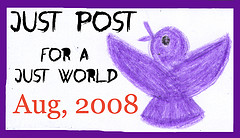
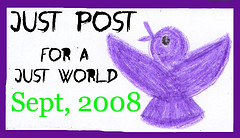
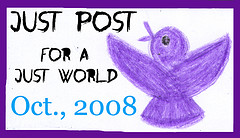


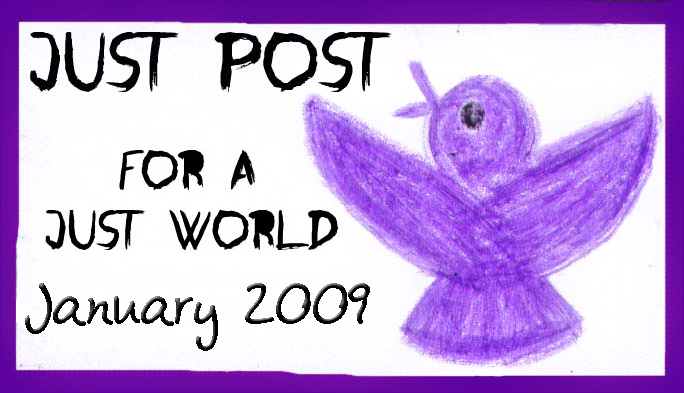
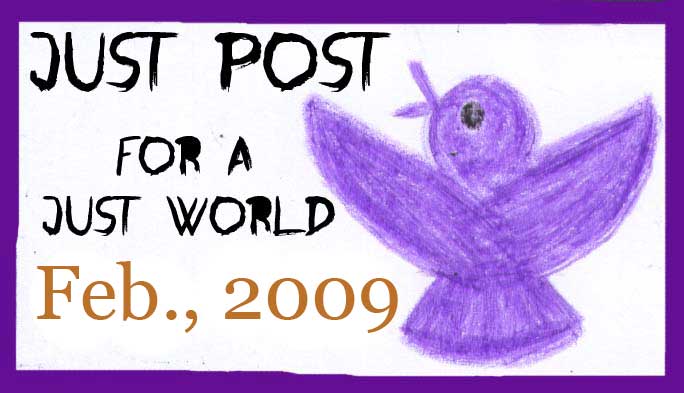








Charlotte | 22-Aug-09 at 9:26 pm | Permalink
It’s a shame you had to forfeit moderating but this excellent post is the result. You bring up a very, very important point in your discussion of the haves and have-nots in this city and I really think that is the divide in the larger healthcare debate.
liprap | 22-Aug-09 at 10:11 pm | Permalink
I am so sorry that you didn’t mention race and class, and I’m sorry I didn’t mention it, either. It certainly has a much bigger role in our health culture here than we’d like to acknowledge.
But then again, the subject of health care alone on a local level could take up another conference.
Still very, very happy you were there…and I hope there will be more folks like you and Dr. Irimpen who will keep directly assessing these issues and how they are linked to our health.
chrissieroux | 23-Aug-09 at 5:49 am | Permalink
I absolutely agree with you about the relative ineffectiveness of discussing local services in a forum like RT. Cade and I were talking about this exact thing on the way home yesterday.
I think a large part of the reason the discussion was not focused where it should have been focused–on future systems, issues of race and class and language–was because of all of the talking in the back of the room. A large part of the audience was highly distracted and irritated by the disruption, and I think this left people frustrated and unfocused.
chrissieroux | 23-Aug-09 at 6:05 am | Permalink
Having said that, I do think the forum was very useful in highlighting our weaknesses and strengths as a community. The virtual community is well-posed to continue the discussion(s): How do we, as wounded healers (per Loki’s comment) and helpers immersed in a dysfunctinal system, take a step back and examine the dysfunction? That’s not easy. And what do we do about these issues of providing quality and equal care for all residents? And per Susan Tucker’s comments about the price of healthy foods: how do we ensure that all people have access to fresh, affordable foods? I remember Editor B wrote a great post a while back about the new neighborhood market in his area–how it’s name, “Eat Well” or something like that, did not reflect the fact that the market contained almost exclusively processed foods. We can get these discussions going, and continue them.
I also think, in these types of forums, that break-away groups with time built in for small-group discussion would be really helpful.
liz | 23-Aug-09 at 10:53 am | Permalink
I think it would have been better for you to retain the moderator position and have a small panel, being a moderator is really hard. I think having a moderator who hadnt had time to prepare to manage the flow of topics contributed to the decision to go with extended Q&A, which turned out to be not as directed as some of the other panels.
Painted Maypole | 25-Aug-09 at 12:06 pm | Permalink
thank you. i had hoped that the racism and classism that Katrina exposed would create much more dialogue (and then action!) both locally and nationally, but it seems we have all “politely” chosen to look the other way. Again.
Cold Spaghetti » Blog Archive » Just Posts: August 2009 | 09-Sep-09 at 9:07 am | Permalink
[…] at Cold Spaghetti with: Superheros; Thoughts on Rising Tide 4; and Why does New Orleans have different moral rules of […]
kitty | 11-Sep-09 at 12:59 am | Permalink
Bravo, Holly, you are such a big thinker and it is refreshing to read your take on things.
I have been digging around the internet for some info on separate but equal care re charity hospitals and haven’t found anything, maybe I’m not looking in the right places?